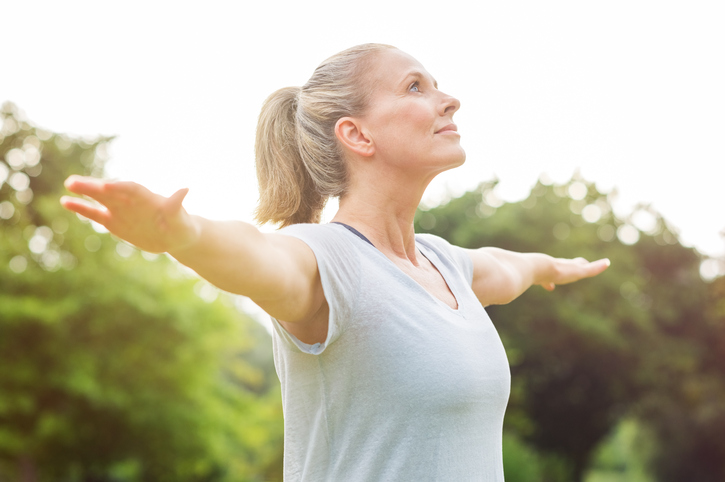Physical wellness can enhance your health but has surprising benefits for other domains of wellness. Exercise can lead to powerful improvements to the mental, emotional, and spiritual domains of one’s life, and is a valuable tool for trained wellness counsellors to bring to their own lives and those of their clients.
Interested in learning more about the non-physical benefits that exercise can impart? Here are some valuable examples.
Become a Wellness Counsellor and You May See a Strong Correlation Between Exercise & Contentment
It is well known that there is a link between engaging in physical exercise and enjoying improved mood. However, the extent to which this is true may be surprising to some.
In addition to short-term mood improvements realized through acute exercise such as a single run or one outing at the gym, there is also “good epidemiological data to suggest that active people are less depressed than inactive people” (Weir, K., 2011, December). Various explanations have been offered regarding this phenomenon, such as exercise leading to the production of higher levels of serotonin (a neurochemical associated with mood regulation), promoting more regular sleep patterns, or by serving as a “meaningful activity and providing a sense of accomplishment” (Weir, K., 2011, December).

Exercise is associated with short and long-term improvements to emotional wellbeing
As both a short-term boost for mood and as part of a longer-term plan for improved emotional wellness, exercise is a hugely valuable tool. For those completing a diploma in wellness counselling, learning to encourage clients to add physical exercise to their routine is an important part of their counseling toolkit.
Exercise Has Been Found to Encourage Creative Thinking
Research suggests individuals who engage in daily creative activity can enjoy greater levels of positive psychological functioning than individuals who do not (Conner, T. S., DeYoung, C. G., & Silva, P. J., 2016). Though the capacity for creativity can seem mysterious and elusive, there is also evidence to suggest that regular exercise has a positive correlation with greater creativity (Colzato, L. S., Szapora, A., Pannekoek, J. N., & Hommel, B., 2013). Once you become a wellness counsellor, encouraging clients to adopt a regular exercise regimen could help them unlock their creative potential and experience the joys that can come with it.
Exercise Can Help Clients With PTSD
Occasionally, a wellness counsellor may discover that a client is living with a deep trauma. The effects of severe trauma often linger for many years, exerting a harmful, negative influence over a client in the form of post-traumatic stress disorder (PTSD). This could have an impact on many aspects of a client’s life, potentially affecting everything from relationships to work and more.
Post-traumatic stress disorder is also much more common than many would believe. In fact, Canada has one of the highest rates of PTSD, with some estimates noting that almost one in ten Canadians will exhibit symptoms of PTSD at some point in their life (The Nature of Things, 2017). For this reason, knowledge of sexual abuse and trauma counselling are included in top wellness counselling programs, so that graduates are equipped with the basic counselling skills necessary to navigate this condition.
Fortunately, evidence suggests that exercise can also be beneficial to clients with PTSD. According to findings, regular exercise “is associated with reduced PTSD and depressive symptoms.” (Rosenbaum, S., Sherrington, C., & Tiedmann, A. 2015). While this presents a potential path to recovery from trauma, it is important to note that “recent observational studies of nonveterans have shown individuals with PTSD engage in less planned exercise than those without PTSD” (Whitworth, J. W., MA, & Ciccolo, J. T., PhD., 2016). Therefore, encouraging clients to add exercise to their routine could be a challenging yet important part of their recovery.
Do you want to learn the many skills needed by today’s wellness counsellors?
Complete top-quality wellness courses in Vancouver! Contact Rhodes Wellness College to get started.
Works Cited
Whitworth, J. W., MA, & Ciccolo, J. T., PhD. (2016). Exercise and Post-Traumatic Stress Disorder in Military Veterans: A Systematic Review. Military Medicine,181(9), 953-960. doi:https://doi.org/10.7205/MILMED-D-15-00488
Colzato, L. S., Szapora, A., Pannekoek, J. N., & Hommel, B. (2013). The impact of physical exercise on convergent and divergent thinking. Frontiers in Human Neuroscience. doi:https://doi.org/10.3389/fnhum.2013.00824
Conner, T. S., DeYoung, C. G., & Silva, P. J. (2016). Everyday creative activity as a path to flourishing. The Journal of Positive Psychology,1-9. http://dx.doi.org/10.1080/17439760.2016.1257049
Rosenbaum, S., Sherrington, C., & Tiedmann, A. (2015). Exercise augmentation compared with usual care for post-traumatic stress disorder: a randomized controlled trial [Abstract]. Acta Psychiatrica Scandinavica,131(5), 350-359. doi:10.1111/acps.12371
The Nature of Things (2017, January). PTSD: Beyond Trauma. Retrieved from http://www.cbc.ca/natureofthings/features/ptsd-canada-has-the-highest-rate-and-other-surprising-things
Weir, K. (2011, December). The exercise effect. Monitor on Psychology, 42(11), 48. Retrieved September 22, 2017, from http://www.apa.org/monitor/2011/12/exercise.aspx










